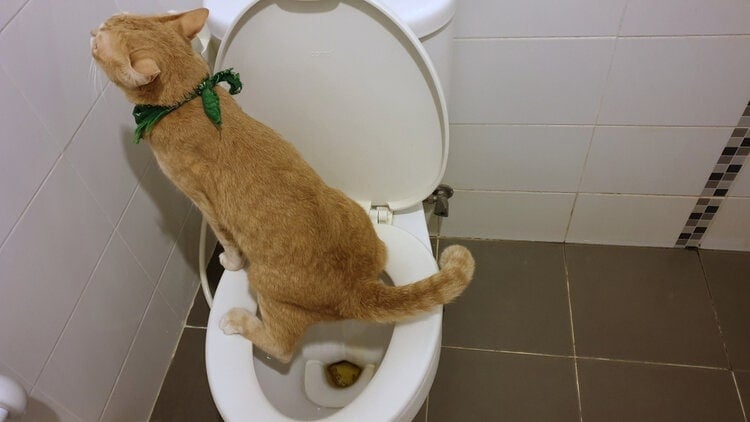Why Flushing Cat Poop Down Your Toilet Is Harmful - Tips for Correct Disposal
Why Flushing Cat Poop Down Your Toilet Is Harmful - Tips for Correct Disposal
Blog Article
Just about every person maintains their own conception when it comes to How to Dispose of Cat Poop and Litter Without Plastic Bags.

Introduction
As pet cat proprietors, it's essential to be mindful of how we get rid of our feline buddies' waste. While it might seem convenient to purge cat poop down the commode, this technique can have destructive effects for both the environment and human health and wellness.
Environmental Impact
Purging feline poop introduces hazardous microorganisms and bloodsuckers into the water system, posing a substantial risk to water environments. These pollutants can adversely influence aquatic life and compromise water top quality.
Health Risks
In addition to ecological problems, flushing cat waste can also position wellness dangers to human beings. Feline feces may consist of Toxoplasma gondii, a bloodsucker that can trigger toxoplasmosis-- a possibly extreme illness, particularly for expectant ladies and people with damaged immune systems.
Alternatives to Flushing
Luckily, there are much safer and more responsible means to get rid of cat poop. Take into consideration the complying with choices:
1. Scoop and Dispose in Trash
The most typical technique of taking care of feline poop is to scoop it right into a biodegradable bag and toss it in the garbage. Be sure to use a dedicated trash scoop and get rid of the waste without delay.
2. Use Biodegradable Litter
Go with eco-friendly cat trash made from materials such as corn or wheat. These clutters are environmentally friendly and can be securely disposed of in the garbage.
3. Hide in the Yard
If you have a yard, take into consideration hiding pet cat waste in an assigned location away from vegetable yards and water sources. Make certain to dig deep enough to avoid contamination of groundwater.
4. Mount a Pet Waste Disposal System
Invest in a pet dog garbage disposal system especially designed for cat waste. These systems use enzymes to break down the waste, minimizing odor and environmental impact.
Verdict
Accountable family pet possession prolongs past supplying food and shelter-- it also involves correct waste administration. By avoiding purging pet cat poop down the toilet and choosing alternative disposal methods, we can minimize our environmental impact and protect human wellness.
Why You Should Never Flush Cat Poop Down the Toilet
A rose by any other name might smell as sweet, but not all poop is created equal. Toilets, and our sewage systems, are designed for human excrement, not animal waste. It might seem like it couldn’t hurt to toss cat feces into the loo, but it’s not a good idea to flush cat poop in the toilet.
First and foremost, assuming your cat uses a litter box, any waste is going to have litter on it. And even the smallest amount of litter can wreak havoc on plumbing.
Over time, small amounts build up, filling up your septic system. Most litter sold today is clumping; it is made from a type of clay that hardens when it gets wet. Ever tried to scrape old clumps from the bottom of a litter box? You know just how cement-hard it can get!
Now imagine just a small clump of that stuck in your pipes. A simple de-clogger like Drano isn’t going to cut it. And that means it’s going to cost you big time to fix it.
Parasitic Contamination
Believe it or not, your healthy kitty may be harboring a nasty parasite. Only cats excrete Toxoplasma in their feces. Yet it rarely causes serious health issues in the cats that are infected. Most people will be fine too if infected. Only pregnant women and people with compromised immune systems are at risk. (If you’ve ever heard how women who are expecting are excused from litter cleaning duty, Toxoplasma is why.)
But other animals may have a problem if infected with the parasite. And human water treatment systems aren’t designed to handle it. As a result, the systems don’t remove the parasite before discharging wastewater into local waterways. Fish, shellfish, and other marine life — otters in particular — are susceptible to toxoplasma. If exposed, most will end up with brain damage and many will die.
Depending on the species of fish, they may end up on someone’s fish hook and, ultimately on someone’s dinner plate. If that someone has a chronic illness, they’re at risk.
Skip the Toilet Training
We know there are folks out there who like to toilet train their cats. And we give them props, it takes a lot of work. But thanks to the toxoplasma, it’s not a good idea.
:max_bytes(150000):strip_icc()/0S1A1090-49a8e2c66f8e41d6901f2559787a7f24.jpg)
I was brought to that write-up on Can You Flush Cat Poo or Litter Down the Toilet? from a good friend on another blog. Be sure to take the time to share this post if you liked it. Thank-you for your time invested reading it.
Book A Free Estimate Report this page